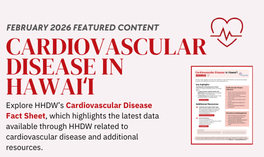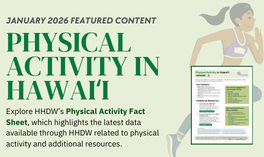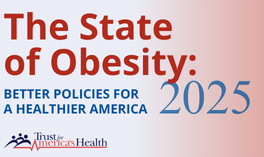Mental health is part of everyday life and overall health in all stages of life, from keiki to kupuna, and includes emotional, psychological, and social well-being. While positive mental health has been linked to optimism, self-esteem, and healthy relationships1, mental health complications can greatly impact physical health, putting an individual at risk for other health conditions.2 The COVID-19 pandemic has also heightened the interest in mental health issues.
The Child & Family Mental Health Tracker brings together information, in an easy-to-review format, from national and state population-based surveys focusing on measures that impact women, children, and families. Healthy People 2030 targets are provided when available. It is brought to you by the Hawai‘i State Department of Health Family Health Services Division and the Pediatric Mental Health Care Access program.
This tracker contains over 40 health indicators, which are organized into the following groups:
- Depression and Suicide
- Child Mental Health Conditions & Treatment
- Attention Deficit Hyperactivity Disorder
- Parent Mental Health
- Adverse Childhood Experiences
- Alcohol and Drugs
- Bullying
- Protective Factors
- Access to Mental Health Services
For each indicator, you can read how it is defined and collected, and view comparison data and trends through charts and tables.
Here are some Hawaiʻi data highlights you can find with this tracker:
- 34.8% of high school students reported signs of depression lasting two or more weeks in the past 12 months in 2021. 46.9% of female students reported signs of depression compared to 23.4% of male students.
- 22.8% of middle school students reported that they received the mental health help they need when they feel sad, empty, hopeless, angry or anxious in 2021. Students who identified as straight were more likely to receive mental health help (24.9%) compared to those who identified as gay, lesbian, bisexual or other (16.5%).
- 51.1% of parents or guardians of children ages 0-17 felt that they are handling the day-to-day demands of raising children very well between 2020 and 2021. This rate has decreased significantly over the years and is lower than the US value of 58.8%.
- 13.7% of women reported signs of post-partum depression in 2020. This rate is not statistically different from the previously measured value in 2019 (11.1%).
Explore the tracker on your own here.
References:
1. Connell, J., Brazier, J., O’Cathain, A. et al. Quality of life of people with mental health problems: a synthesis of qualitative research. Health Qual Life Outcomes 10, 138 (2012). https://doi.org/10.1186/1477-7525-10-138
2. Center for Disease Control and Prevention (CDC). About Mental Health. Published November 23, 2021. Accessed March 2023. https://www.cdc.gov/mentalhealth/learn/index.htm




